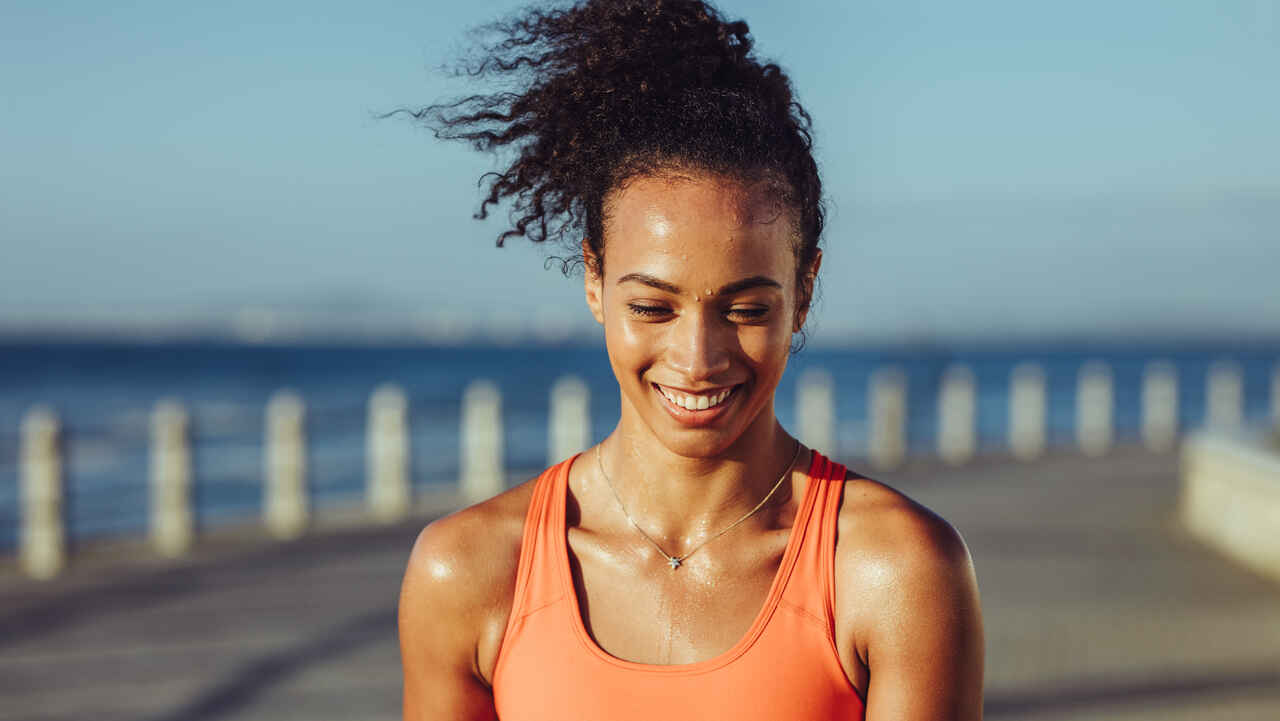 Don’t let heat and humidity ruin your workout. Here’s how to exercise more safely in summer.
Don’t let heat and humidity ruin your workout. Here’s how to exercise more safely in summer.
During the summer, many people prefer to take their workouts outdoors rather than being stuck inside on a treadmill or at the gym. Whether you like running, hiking, biking, tennis, yoga or any other workout, engaging in such activities may be more enjoyable amidst some sun and fresh air. But these activities may also be harder on your body, and even dangerous, if you aren’t careful as the mercury rises.
Here are 5 important tips to keep in mind so you stay safer when working out in summer heat.
- Schedule your workout around the weather. Plan to be active during the early morning or evening hours, when temperatures are typically cooler than midday. If there are excessive heat warnings, high humidity levels or poor air quality alerts, consider bringing your workout indoors. Not only can a workout feel more challenging when it’s hot and humid, but it’s also harder on your body and can even become dangerous. Depending on weather conditions, it may be a good idea to scale back the duration and intensity of your workout.
- Hydrate, hydrate, hydrate. No matter what type of activity you do, make sure you are well hydrated. That means you should be drinking enough before, during and after your workout – and all day long. Water is preferred for its ability to be taken up quickly by your body’s tissues. Water-rich fruits and vegetables, like watermelon, lettuce, cucumbers, berries and tomatoes, also count towards your overall fluid intake. In extreme heat or during activity that lasts more than an hour, consider a sports drink that contains electrolytes to help your body refuel and rehydrate more efficiently.
- Gear up properly. Wearing the right gear for the weather is just as important as hydrating right. Light-colored, loose-fitting clothing will keep you cooler than darker, heavy or tight-fitting clothes. Also opt for sweat-wicking performance fabrics rather than cotton. If it’s sunny out, wear UV-blocking sunglasses and a hat to shield your face from the sun. Sunny or not, lather up with a water-resistant sunscreen with 30 SPF or higher. Your body has a harder time cooling down if you have a sunburn.
- Stay cool while you refuel. After your workout, help your body cool down by refueling with refreshing foods and drinks like these:
-
-
- Fruit smoothies
- Whole fruit popsicles or frozen fruit
- Cold vegetable salads
- Yogurt parfaits
- Raw veggies and hummus or dip
-
-
- Watch for warning signs. Dehydration occurs when fluid lost through sweat isn’t replaced. Even mild dehydration can cause you to feel poorly and can increase your risk of more serious heat-related problems. Know the signs of dehydration and take immediate action to seek shade, rest and hydrate if you begin to experience any of them.
Signs of mild dehydration include:
-
- Thirst
- Dry or sticky mouth
- Dry, cool skin
- Headache
- Muscle cramps
- Dark urine
Moderate to severe dehydration symptoms include:
-
- Not urinating or very dark-colored urine
- Dry, shriveled skin
- Irritability or confusion
- Dizziness or lightheadedness
- Rapid heartbeat
- Breathing rapidly
- Fatigue or listlessness
- Unconsciousness
Taking your workout outdoors during summer can breathe new life into your fitness routine. But although the change in scenery may do you good, it’s important to follow these commonsense practices so you stay safe and healthy when temps and humidity soar.
Copyright 2021 © Baldwin Publishing, Inc. All rights reserved.
Health eCooking® is a registered trademark of Baldwin Publishing, Inc. Cook eKitchen™ is a designated trademark of Baldwin Publishing, Inc. Any duplication or distribution of the information contained herein without the express approval of Baldwin Publishing, Inc. is strictly prohibited.
Date Last Reviewed: May 12, 2021
Editorial Review: Andrea Cohen, Editorial Director, Baldwin Publishing, Inc. Contact Editor
Medical Review: Perry Pitkow, MD
Learn more about Baldwin Publishing Inc. editorial policy, privacy policy, ADA compliance and sponsorship policy.
No information provided by Baldwin Publishing, Inc. in any article is a substitute for medical advice or treatment for any medical condition. Baldwin Publishing, Inc. strongly suggests that you use this information in consultation with your doctor or other health professional. Use or viewing of any Baldwin Publishing, Inc. article signifies your understanding and agreement to the disclaimer and acceptance of these terms of use.